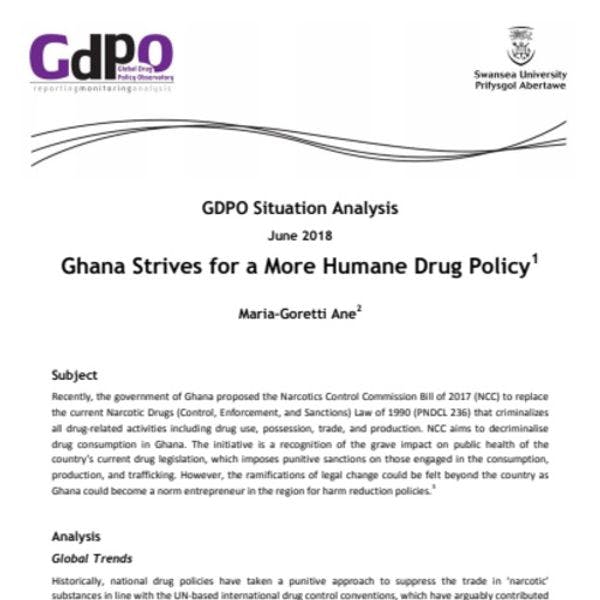Ghana strives for a more humane drug policy
By Maria-Goretti Ane
Subject Recently, the government of Ghana proposed the Narcotics Control Commission Bill of 2017 (NCC) to replace the current Narcotic Drugs (Control, Enforcement, and Sanctions) Law of 1990 (PNDCL 236) that criminalizes all drug-related activities including drug use, possession, trade, and production. NCC aims to decriminalise drug consumption in Ghana. The initiative is a recognition of the grave impact on public health of the country’s current drug legislation, which imposes punitive sanctions on those engaged in the consumption, production, and trafficking. However, the ramifications of legal change could be felt beyond the country as Ghana could become a norm entrepreneur in the region for harm reduction policies.
Analysis Global Trends Historically, national drug policies have taken a punitive approach to suppress the trade in ‘narcotic’ substances in line with the UN-based international drug control conventions, which have arguably contributed to a range of failed policies including Plan Colombia and mandatory sentencing in the United States. After decades of harsh drugs policies, the United Nations Office on Drugs and Crime (UNODC) found in 2015 that about a quarter of billion people from the age of 15-64 consumed illicit drugs. The result of these measures are high levels of drug use and the harms that are associated with them has resulted in a shift in some parts of the world towards legalisation and decriminalisation models. For example, in 2001, Portugal decriminalised drug procession for personal use. In 2017, Uruguay became the first country to legalise cannabis for recreational purposes. Furthermore, 29 states within the United States have legalised the recreational and medicinal use of cannabis. Ghana’s reconsideration of drug laws is in line with this trend through the decriminalisation of Ghana’s Narcotic Control Commission Bill of 2017.
Regional trends Regionally, there have been indications of changing attitudes to drug policy, linked to better understanding of the counter-productive effects of criminalisation. For instance, in its 2014 report, the West Africa Commission on Drugs (WACD), called for the decriminalisation of possession for personal use. The report provided evidence showing that criminalisation of drug use worsens health and social problems, puts undue pressure on the criminal justice system and fosters corruption.
